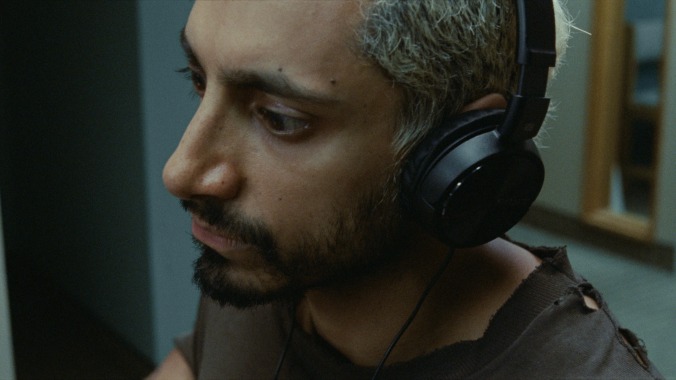Riz Ahmed’s superb lead performance keeps Sound Of Metal on beat


Sound Of Metal is nothing without its sound design. It’s a story about music and deafness—both auditory phenomena—and its success depends on being able to put you into the main character’s beat-up Converse. The film does accomplish that, thanks in part to its unique, first-person approach to sound. Darius Marder, making his feature directorial debut after writing The Place Beyond The Pines, clarifies in the press notes that “Deafness is not silence.” It’s an idea that he and sound designer Nicholas Becker express through modulations that reflect the nuances of hearing loss. Sometimes it sounds like we’re underwater; other times there’s a shrill, high-pitched hum around the perimeter of the dialogue. Combined with Riz Ahmed’s nuanced, naturalistic lead performance, the result is a palpably empathetic experience. But the film’s commitment to realism isn’t always an asset.
Ahmed stars as Ruben, the drummer for a moderately successful noise-metal group called Blackgammon. (If nothing else, movie band names prove how difficult it is to come up with a great one in real life.) The duo is loosely based on husband-and-wife sludge metal band Jucifer, who appeared in a since-abandoned project Marder edited back in 2009; their real-life counterparts don’t have any experience with hearing loss, but like Jucifer, Ruben and guitarist-vocalist Lou (Olivia Cooke) are a couple leading a blissfully nomadic existence, driving from show to show in their stylish vintage RV. In terms of realism, Sound Of Metal is the best depiction of touring life since Green Room, portraying the movie’s metalheads as laid-back jokesters in threadbare T-shirts whose intensity mostly manifests on stage. (Except for Ruben, but we’ll get to that in a minute.) We get some of that fire in the movie’s opening scene, where Ahmed and Cooke—with some coaching from noise artist Margaret Chardiet, a.k.a. Pharmakon–perform an avant-garde blend of spoken-word growling and blast beats over thundering guitar.
This immersive heavy metal ride-along doesn’t last long, though, as a deft bit of aural repetition reveals that Ruben is losing his hearing at an alarmingly swift rate. As broke musicians with no health insurance do, he goes to a pharmacy in the nearest town for help and is referred to a specialist who informs him that he’s already lost 75% of his hearing range, and if he wants to keep the other 25%, he needs to avoid loud sounds—i.e., give up the thing that gives his life meaning. This scene is where Ahmed’s performance really begins to shine, beginning with a subtle, seemingly involuntary widening of his eyes and reflexive swallow when he hears the news. If you’ve spent time in a subcultural community, you’ve met a guy like Ruben, a volatile, tightly wound person whose passion for extreme music is the only thing keeping them from plunging off of a cliff. Sound Of Metal amplifies this dynamic by making Ruben a recovering addict, whose rage-fueled internalizing of his new condition scares Lou enough that she insists they cancel the tour and head straight to a deaf sober living retreat. (They can keep going, Ruben desperately argues; she just needs to follow him, like a click track.)
The remaining three-quarters of the film is devoted to Ruben’s inner journey as he faces a choice: accept and adapt, or desperately cling to what’s been working for him so far. Joe (Paul Raci), the owner of the facility and a real-life metalhead, tries to steer Ruben in the former direction, gently reminding him that not everyone believes deafness is a handicap and that his fixation on getting enough money for the cochlear implant he thinks will solve all of his problems is not unlike an addict’s obsession with the next fix. An extended middle portion set at the facility, which also houses a school for deaf children, unfolds languidly and in near silence as characters converse in ASL (American Sign Language)—which is subtitled, along with captioning for the spoken dialogue for non-hearing viewers. Slowing the film to the speed of daily life in this community is a principled commitment to realism. But in terms of storytelling, this radical deceleration after the harrowing propulsion of the first half-hour feels like driving into a brick wall, creating suspicions that the script isn’t sure how to resolve the scenario it’s so carefully set up.
What keeps Sound Of Metal from wandering off into the wilderness is Ahmed’s performance, which remains compelling even when the script loses its narrative footing. (He’s so good, in fact, that Cooke’s screwed-up worry face seems a bit one-dimensional by comparison.) When he first arrives at Joe’s secluded farmhouse, Ruben is a vessel overflowing with frustration and sorrow, his eyes welling up with tears when he finally admits, “Today is not a good day.” Over the following weeks (or months? It’s difficult to say) the change in the character is reflected not only in Ahmed’s eyes but also in his posture, which changes from clenched to relaxed and open. He’s a seeker on a pilgrimage for inner peace, and it’s not clear if he ever quite finds it. But the important thing, as he learns from a series of gurus throughout Sound Of Metal, is to keep putting one foot in front of the other—or one stick in each hand, as the case may be.